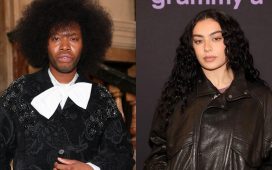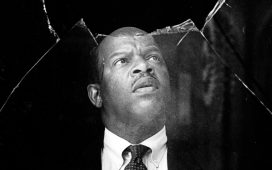The one element of movie art that “The Apprentice” spotlights is acting. A dramatization of Donald Trump’s rise to prominence in the nineteen-seventies and eighties, the film features a cast of characters that includes members of the Trump family and New York political and social eminences—foremost, the lawyer-slash-fixer Roy Cohn, whose mentorship of Trump offers one explanation of the movie’s title. The actors playing these roles, including Sebastian Stan, as Trump, and Jeremy Strong, as Cohn, form something of a litmus test for styles of performance—and for the power (or failure) of visual compositions to showcase them.
The movie, directed by Ali Abbasi and written by Gabriel Sherman, starts with the twentysomething Donald (we’ll call the characters by their first names to distinguish them from the real people) enduring a serious case of outer-borough syndrome. He works with his father, Fred Trump, Sr. (Martin Donovan), managing Trump Village, a middle-class apartment complex in Coney Island. Donald’s work is grubby: he goes door-to-door collecting rents, often in cash, dispensing threats of eviction and facing tenants’ insults and even physical aggression. He wants more—namely, to be a real-estate player in Manhattan—and he starts big, with a plan to renovate the Commodore Hotel, next to Grand Central Terminal. There’s a certain vision behind his grandiosity: New York City, at the time, was in dire financial straits and widely considered to be in irreversible decline, but Donald was certain that the city would rebound and that he could help make New York great again.
Donald’s idea of New York was Manhattan—the bright lights, the movers and shakers—and he was desperate to be part of its high society. Accepted to the selective private restaurant and night club Le Club, Donald was perceived there as a relative nobody. But, the movie suggests, he was perceived nonetheless—while sitting alone after a disastrous date—by one of the club’s most prominent members, Roy Cohn, who invites the clumsy young striver to his festive table and introduces him to two Mafia kingpins who are also seated there. Donald explains that he’s in the real-estate business (and is galled when he’s identified as “Fred Trump’s kid”) and says that the company has trouble from a federal lawsuit alleging racial discrimination in their selection of tenants for Trump properties. Roy offers some unsolicited advice: countersue, make the government work, admit nothing. When the unresolved charges threaten to scuttle Donald’s deal for the Commodore, he recruits Roy to represent the company, officially, in court.
In the film’s telling, Donald’s rise to success and fall into moral turpitude are linked by the bare-knuckle tactics with which Roy helps him make his fame and fortune. Donald, a worthy apprentice, ultimately runs his personal life in similarly ruthless fashion. Constantly on the make with women (Roy tells him, “I bet you fuck a lot”), Donald nonetheless has a romantic streak; when Ivana Zelníčková (Maria Bakalova) turns up at Le Club, he ramps up quickly from flirtation to courtship. But when he tells Roy that he’s going to marry her, Roy first scoffs, then insists on having Ivana sign a prenup—a demand that nearly ends the engagement. It’s exemplary of Donald’s Queens provincialism that, even while cutting a figure in the city’s night life, he idealizes the institution of marriage and the lifelong union of his parents, Mary (Catherine McNally) and Fred, Sr.
Sherman, a journalist, delves deeply into the practicalities of Donald’s business and its political background, which are by far the most notable aspects of the movie. In court for the racial-bias case, Roy displays chutzpah of comedic dimensions, as when he challenges a Black investigator’s mention of white tenants on the ground that the witness can’t assume their race from the way that they look. But that show of audacity is minor compared with how Roy blackmails a federal official who’s behind the suit. Casually confronting the official in a restaurant (and doing so in Donald’s presence), Roy shows him photos suggesting an extramarital—and same-sex—relationship, and reminds him that homosexuals are barred from federal employment. Soon thereafter, the Trumps get away with a slap on the wrist, and the Commodore deal goes through. Roy imparts his operating principle, a sports analogy, to Donald—“Play the man, not the ball.” Leading Donald into his “playroom,” which is filled with audio equipment, Roy teaches Donald how it’s done: by planting mikes when he holds sensitive conversations with potential adversaries, then using his surreptitious recordings as central weapons in his fights against them. What Donald learns from Roy, as Donald puts it, is that there are two kinds of people, killers and losers; Ivana, dubious, wonders, “It’s good not to be a killer, no?” But Donald adopts Roy’s three rules as his own: “attack, attack, attack”; “admit nothing, deny everything”; and always “claim victory and never admit defeat.”
Throughout the rest of the movie, Donald demonstrates his mastery of these methods in a relentless and brazen series of betrayals, disloyalties, cruelties. Roy brings him into a world of corrupt power that proves irresistibly tempting, welcoming him at a party that he hosts with the jocular declaration, “If you’re indicted, you’re invited.” Among the friends to whom Roy introduces Donald are George Steinbrenner (Jason Blicker), Rupert Murdoch (Tom Barnett), and Roger Stone (Mark Rendall). Yet when Roy warns Donald against investing in Atlantic City casinos, Donald quickly turns on him, pushing his mentor into virtual exile that involves hurling verbal insults and inflicting practical indignities. Donald treats Ivana with similar contempt, and then rapes her. (The real-life Trump, as well as the real Ivana, claim that rape never occurred.) Horrific as the scene is, it’s of little practical consequence in the film, because Ivana has little independent existence within it—but there is a telling exchange, too good to spoil, between her and Roy that hints at the depths of her despair. When Donald’s troubled brother Fred, Jr., (Charlie Carrick), called Freddy, who was an alcoholic, dies, in 1981, the loss passes over Donald without even a shadow. “The Apprentice” locates the root of both brothers’ pathologies in the terse, matter-of-fact cruelty of Fred, Sr.








